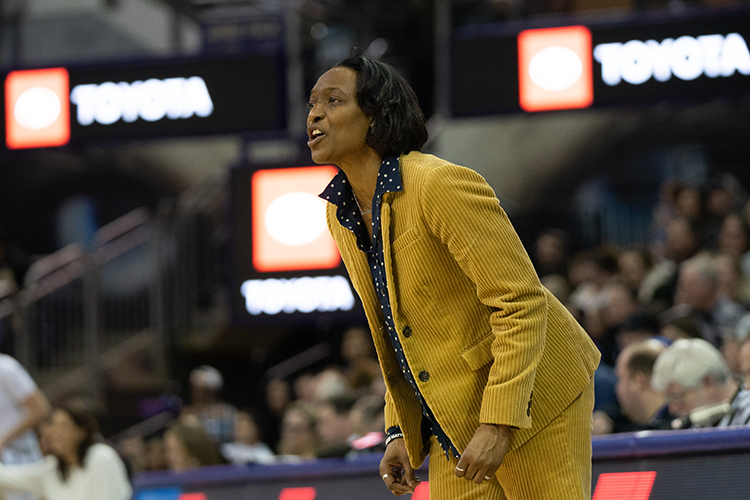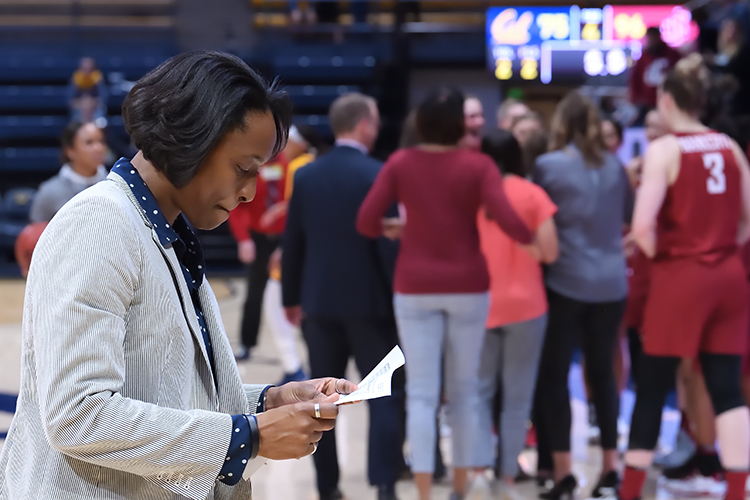Charmin Smith challenges the norm of the white college coach
The Berkeley women’s basketball coach says black women add value to sports management positions
February 25, 2020

Berkeley women’s head basketball coach Charmin Smith on the sidelines during a game. Smith has been a vocal supporter of diversity in college coaching. (Photo courtesy of KLC fotos)
As a child, Charmin Smith didn’t consider the bald spot on the back of her grandfather’s head a sign of his old age, but a historical reminder of when he stood up for equality, like Dr. Martin Luther King Jr., now-U.S. Rep. John Lewis and other civil rights leaders.
“He was hit over the head in a march, in Alabama or Mississippi, in the late 1950s, and the wound left that spot on his head,” said Smith, who is 44. “He was also a Freedom Rider during the civil rights movement and took part in the (1963) March on Washington (for Jobs and Freedom). He spent some time in jail during the movement, as well.”
Smith said we are privileged because of those struggles. Knowing that history helps her to put into perspective how important it is to be the first black coach of UC Berkeley’s women’s basketball team.
It also informs her desire to break the mold and promote a new norm that includes more black coaches in team management positions, at both the collegiate and professional levels.
“I really don’t know a black person in a leadership position who doesn’t feel some sense of pressure to be successful,” said Smith, who was hired as head coach last summer after more than a decade as an assistant coach. “I would like to find a situation in which a black coach failed, and the next person hired was black … You don’t see it very often. We get one shot.”
Numbers don’t lie

Head coach Charmin Smith studies plays during a timeout against the Washington State Cougars on January 3. (Photo courtesy of KLC fotos)
A recent study by FiveThiryEight, a statistical analysis website, shows that from 2008 to 2018, of the 250 head-coaching transitions at the Football Bowl Subdivision level, the top level of U.S. college football, only 2% of them involved a black head coach getting replaced by another.

Read more stories about UC Berkeley’s commemoration of “150 Years of Women at Berkeley.”
As for collegiate basketball, even more glaring is the proportion of black players to black coaches. The most recent research from the National Collegiate Athletic Association (NCAA) shows black players made up 47% of all Division 1 women’s basketball teams, while only 15% of head coaches were black women and 8% were black men. That’s compared to 43% of coaches who were white women and 32% who were white men. The remaining 2% were female and male coaches of other ethnicities.
The research showed that Division 1 men’s college basketball is also disproportionate with 70% white male head coaches, and 56% black players.
Smith, a St. Louis native, took up basketball at a young age, and played point guard on winning Amateur Athletic Union (AAU) and high school basketball teams. Next, she played college ball at Stanford University in the mid-1990s and then as a pro with the Women’s National Basketball Association (WNBA).
Looking back, Smith said she didn’t have many female role models in sports and idolized players like Los Angeles Lakers point guard Earvin ‘Magic’ Johnson Jr. She said she had phenomenal coaches who won at the championship level, but recalls having only one black coach her entire playing career, an AAU coach she had for one summer.
This lack of diversity makes it difficult for teams to envision coaches who aren’t white, she said.

Rachel Roberson (UC Berkeley photo Brittany Hosea-Small)
“So, you have young black girls, young black boys looking at college sports, the NBA and the WNBA, and they see this is what a head coach looks like, and you begin to normalize that,” she said. “So, we’re allowed to play, but we’re not allowed to coach … That’s a backwards kind of archaic mentality that we need to get past.”
Research has shown that having a black coach can change how connected black players feel to the team, said Rachel Roberson, a Berkeley graduate student completing her dissertation on gender equity in collegiate athletics.
“The presence of having a black female head basketball coach really mattered in their perception of how they were going to be treated on the team, and if they were going to feel at home in higher education,” said Roberson.
But choosing black women as coaches just because they are black is not the way teams should think about their hiring process, said Smith. The experience and value that a black coach can bring to a team as a qualified candidate is what is important.
“As a black woman, you’re bringing something of value, whether it be helping the culture of the working environment in my position, or whether it is being able to speak to a student-athlete and say, ‘I’ve been in your shoes, I know exactly what you’re going through,’” said Smith. “That shouldn’t be something that is ignored or dismissed in the process. It’s an asset.”
The difference a suit makes

Berkeley center C.J. West, second from right, poses with her family and Smith, far left, on February 23 during Cal Senior Day. (Photo courtesy of KLC fotos)
Smith, who is part of the athletic department’s Equity Inclusion and Diversity Task Force on campus, says the members of her coaching staff, like her players, come from diverse backgrounds. She also has been proactive in creating a community for her players, encouraging them to visit Berkeley’s Fannie Lou Hamer Black Resource Center, introducing them to black CEOs they can learn from and suggesting local organizations where they can volunteer.
Fourth-year Berkeley’s women’s basketball center C.J. West has played hoops since the fifth grade. West, a Bakersfield native, said Smith is the first black female coach she has had. She fondly remembers a time when the whole team laughed at Smith.
Smith, though, flipped the torment back on them.
“She strutted into the locker room before a game wearing a brown corduroy suit and button-down shirt with a popped-up collar, and we were all laughing at her,” West recalled. “Then, she said, ‘You guys are laughing, but I love myself, and I want that for you, too. Be comfortable in your own skin. I want you guys to wear whatever you want and not care about what other people think.’”
“Hearing that from a successful black woman is invaluable advice I never got from a coach before,” West added.
Smith said that, as a black coach and leader, imparting all the advice she can give to the next generation of players and potential coaches of color goes beyond the sport.
“It’s not just about basketball anymore,” said Smith. “I’m trying to find my place in making this world a better place, and right now that is doing this job to the best of my ability and helping the young women in this program be individuals who understand this world and make a difference on and off the court.”